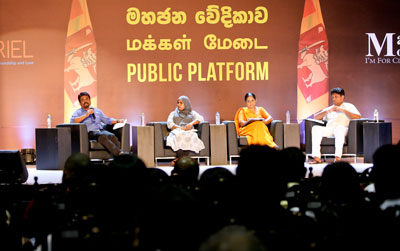News
In a first, candidates come together to answer questions, spell out their visions
View(s):
Anura Kumara Dissanayake and Sajith Premadasa at the event
For the first time in the country’s history, candidates contesting the upcoming Presidential election were invited to share one stage at a “Public Platform” event organised by the civil society group, March 12 Movement, and Afriel Youth Network at the Sugathadasa Indoor Stadium last evening.
The event that was broadcast live on all major television channels and live streamed on the web had two rounds. In the first, eight candidates from minor political parties were given four minutes each to explain their vision for the country. Speakers included Dr Ajantha Perera (Socialist Party of Sri Lanka), Gen. Mahesh Senanayaka (National People’s Party), Sarath Manamendra (Nawa Sihala Urumaya), Rohan Pallewatte (Jathika Sanwardhana Peramuna), Vajirapani Wijesiriwardene (Socialist Equality Party), Duminda Nagamuwa (Frontline Socialist Party), Ariyawansa Dissanayake (Democratic United National Front) and Sirithunga Jayasuriya (United Socialist Party).
In the second round candidates from the main political parties were given three minutes each to answer pre-agreed-on questions. National People’s Movement candidate Anura Kumara Dissanayake and New Democratic Front candidate Sajith Premadasa were present for this session. Conspicuous by his absence was Sri Lanka Podujana Peramuna Presidential candidate Gotabaya Rajapaksa, who had been invited to attend but failed to show up.
Mr Premadasa and Mr Dissanayake were each asked questions on the rule of law, national security, human rights, education, economic reforms and communal harmony.
Responding to a question on how they would empower institutions to ensure the rule of law, national security and human rights, Mr Premadasa said such institutions should be free from political interference.
Mr Dissanayake, responding said he did not believe there was anything wrong with the framework of these institutions. What has happened was that the country’s political culture had shattered this framework. “Accordingly, the law is being applied selectively today. It is being applied in one way for the rich and powerful and in another way for the poor and the weak. The law should be applied equally to all. We will ensure this is done.”
When asked how they would manage the country’s debt burden. Mr Dissanayake said the Auditor General’s records indicate the country was Rs. 11 trillion in debt. The country needed to obtain loans to stablise its economy, he conceded. Loans should only be taken to meet the country’s capital and technological needs. “Only by utlising the loans on productive projects can we get out of this debt crisis,” he said, adding that the other priority was to alleviate poverty at the village level.
Mr Premadasa said economic policies should be directed to identifying projects which are productive to the country and its people and strengthening foreign direct investment. “I believe we can increase the country’s productive efficiency. When this happens, the country will earn more revenue. We can utilise a section of that revenue towards paying off our debts and I am confident we will eventually be able to give our future generations a country without such a debt burden,” he asserted.
The proceedings came to an end with the candidates signing a public pledge to commit to a free and fair election.

